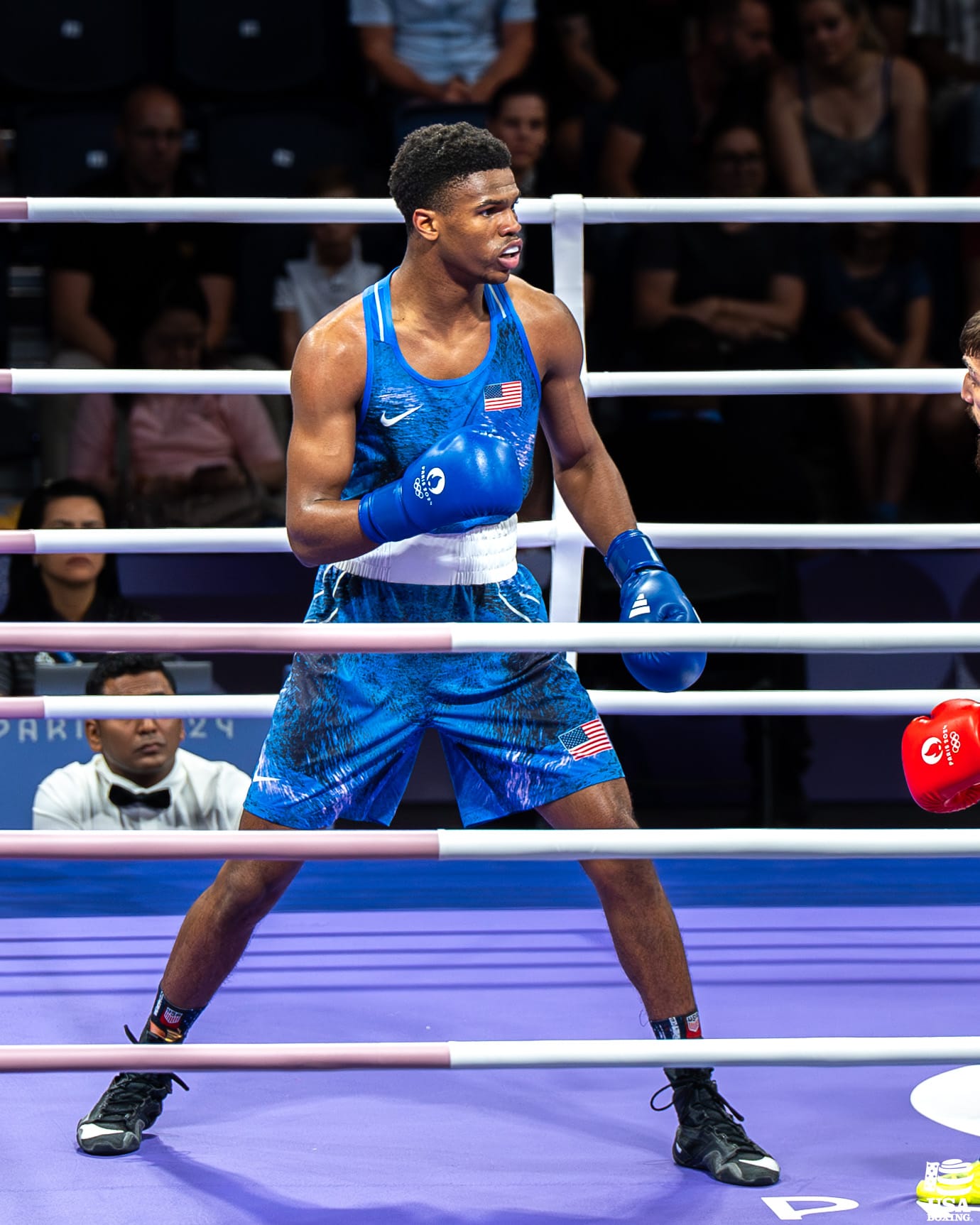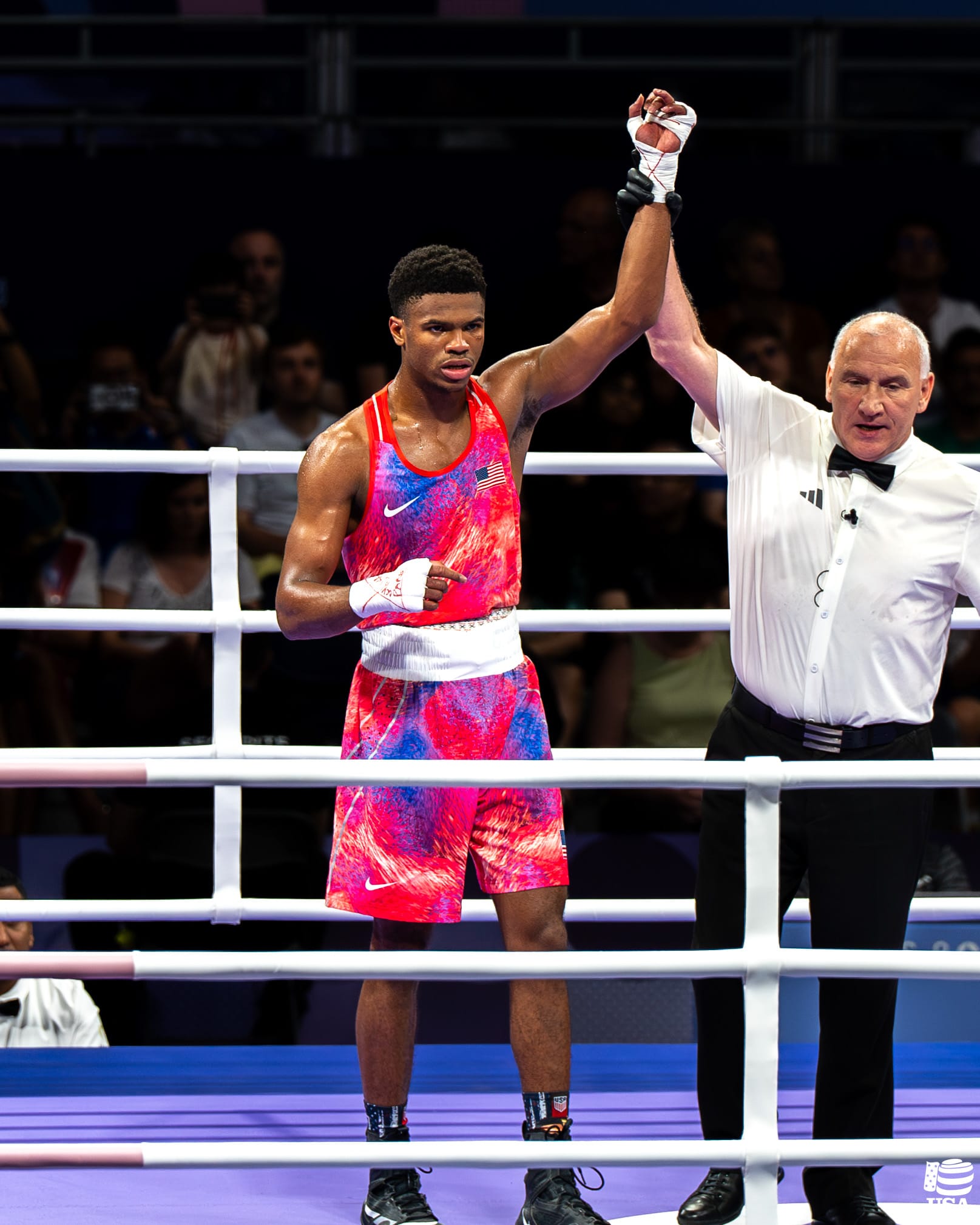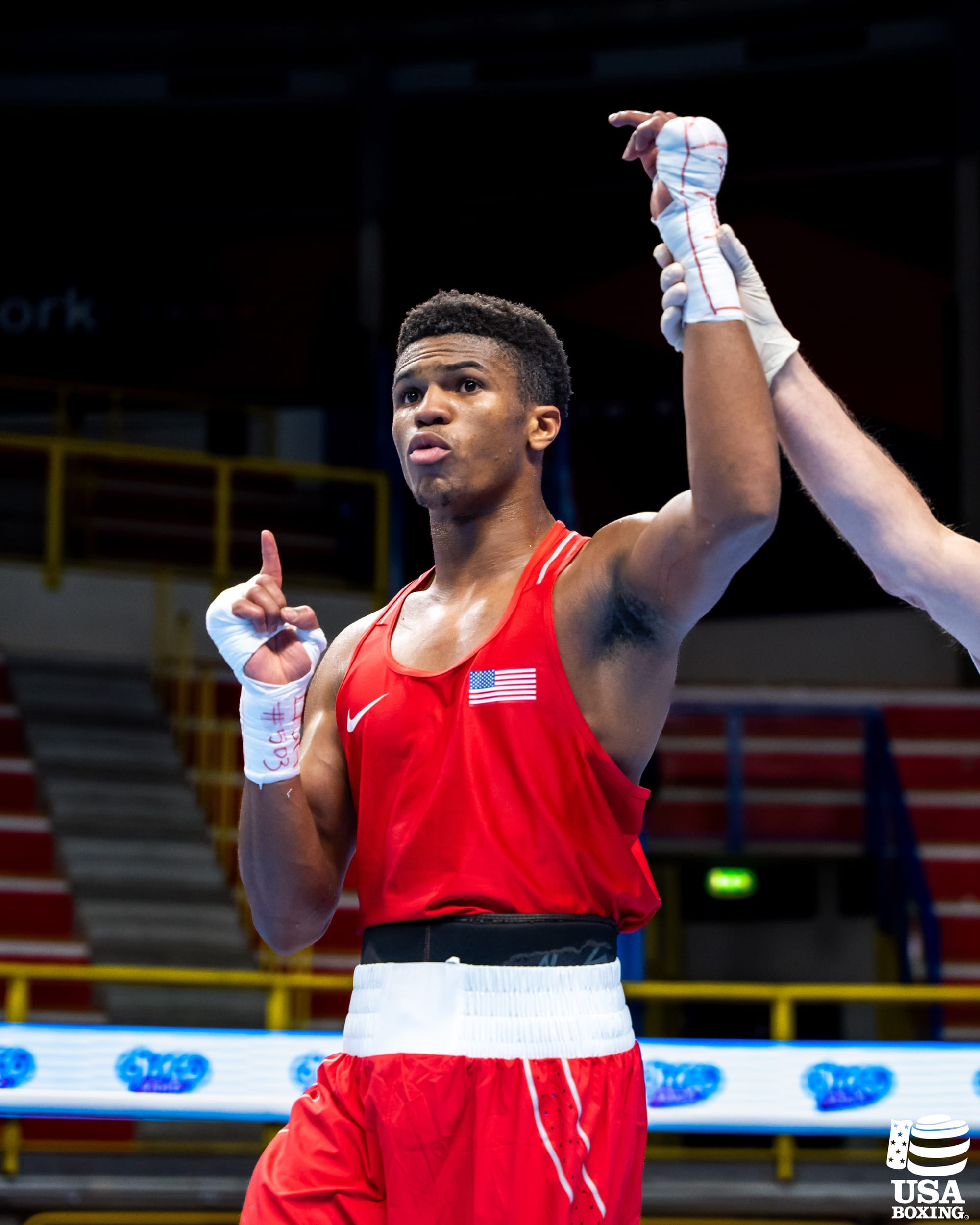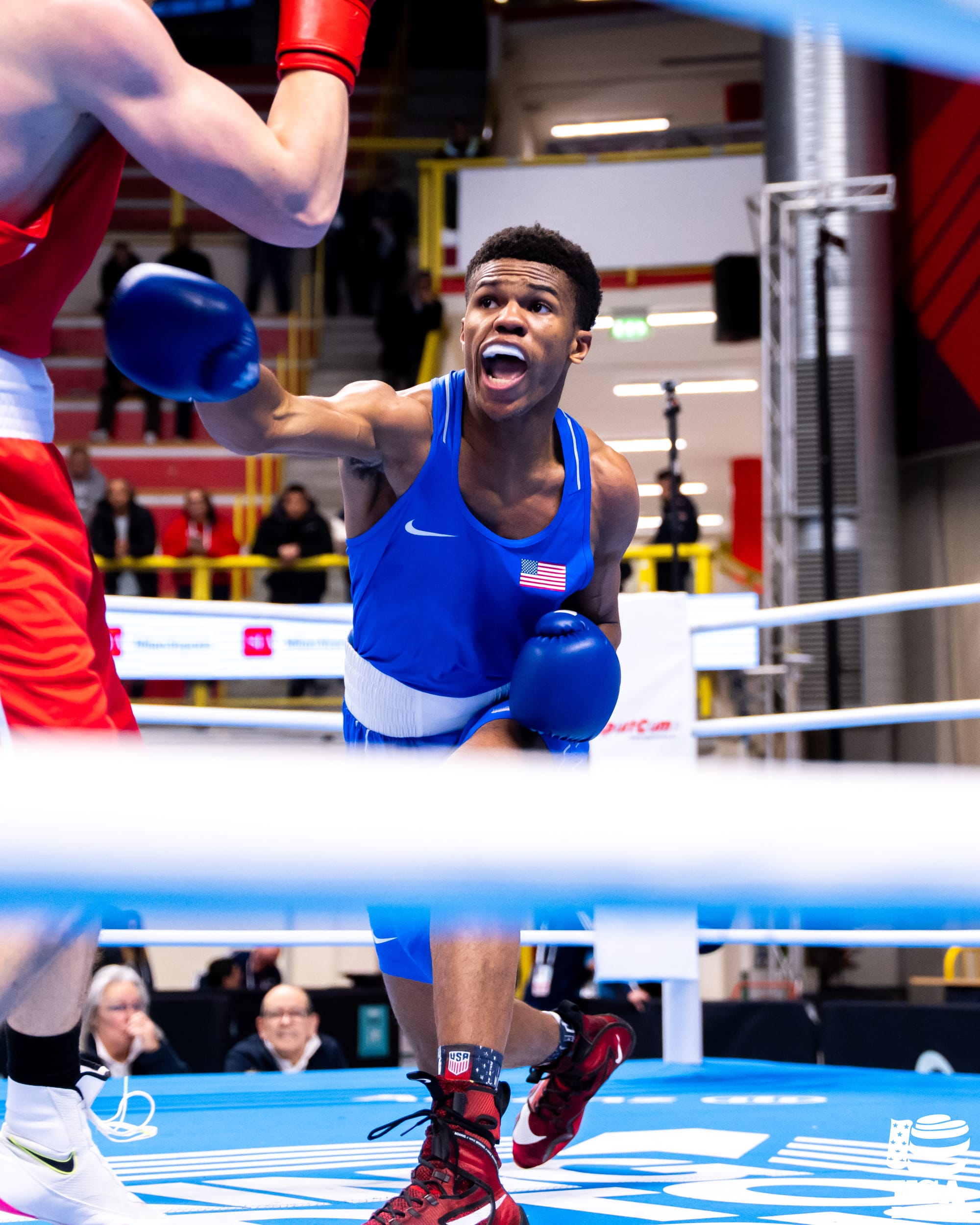
At first, the only fighter Omari Jones bothered to study was the greatest of all time.
Jones was eight years old when he stepped into a boxing ring near his home in Orlando, Florida. Mostly, he was just curious; he’d been practicing karate since he was four, and his friends had started taking up boxing at the same gym, so he decided to follow them. Right away, he was a natural. He moved with ease; he threw so many devastating punches that the coaches watching him immediately gave him a nickname that’s stuck: The Banger.
As Jones learned the sport over the course of the next couple of years, he went straight for the top. He only watched videos of one boxer – Muhammad Ali, who had jump-started his career more than six decades earlier by winning a gold medal at the 1960 Rome Olympics.
Jones is a visual learner, and he found himself studying Ali’s classic fights day after day to learn how to box. Ali-Frazier. Ali-Liston. Jones emulated his footwork. His movement. His speed. And as he grew older, he began envisioning a future where he would fight in the Olympics, too, and where he might bring home a medal himself someday. “His jab, his head movement, his reflexes, his counter punching,” Jones says. “All of that stuff is what I took into consideration. I watched it, and then I'd do it in the ring the next day.”
Eventually, over the course of his teenage years, Jones moved beyond Ali. He watched video of Roy Jones Jr. and Floyd Mayweather and Sugar Ray Leonard. When he qualified for the U.S. National Team, he came across a wall inside the Olympic Training Center in Colorado Springs that bears the names of every boxing medalist. He tried to appropriate the best of all of them – to incorporate the sport's rich history and bring something entirely new to it. And in an era when American boxing has struggled on the world stage, Omari Jones – who turns 22 years old in November – may be one of the sport’s best hopes for a brighter future, if that’s indeed the future he chooses.
As the summer of the Paris Olympics winds to its end, Jones is back home in Orlando, and finally getting a moment to catch his breath. After the Games, he took a vacation to Puerto Rico; he spoke to a group of kids in order to help inspire them the way he was once inspired. He attended a fight won by a current reigning star, Canelo Alvarez; and earlier this week, he went to the White House with a group of Olympians, and posted a photo on Instagram with President Biden. Among that collection of Olympians, Jones was the only U.S. Olympic boxing medalist, having taken home the bronze in the welterweight division. His name will be on that wall in Colorado soon enough.


Omari Jones has a lot on his plate, but the pressing question is, "What's next?" [USA Boxing photos]
So what’s next? Does Jones turn pro? Does he start aiming for a gold medal at the Los Angeles Olympics in 2028? Does he focus on finishing a college degree in business – he’s nearly wrapped up his associate’s degree, and is thinking of transferring to the University of Central Florida to finish his bachelor’s – and turning the clothing business he’s started on the side into a full-time career?
You’ll forgive him if Jones isn’t entirely sure what his future holds yet. You’ll forgive him if, at least for this moment, he’s still kind of focused on the journey he’d just completed. Because for nearly a decade of his life, outside of school and family, the Olympics were pretty much all he thought about.
There was just something about boxing that felt right to him as soon as he stepped into that ring for the first time. In this sport, he wasn’t accountable to anyone but himself. His father, Karl, became one of his coaches, so it was a way for the two of them to bond. The training was difficult, but it was the right kind of difficult for Jones. And the fact that the sport doesn’t hold the same cultural cache it once did in previous decades? Jones didn’t care one bit. He watched those great fighters on screen, and he absorbed the history of the sport even as he endeavored to become a part of it.

“I fell in love with it at age eight and never took a break,” he says. “I never drank. I never smoked. Really, I just solely love the sport.”
Jones got his black belt as a teenager, then decided he loved boxing enough that he wanted to focus on it full-time. Around the time he turned 13, he began dreaming of the Olympics but struggled on the national scene at first, a kid from Orlando with no reputation and no real connections. He kept losing big fights in big tournaments.
Finally, when he was 15, he won a silver medal at the Junior Olympics, then began setting his sights on winning the USA Boxing national tournament, which would earn him a spot on Team USA and potential path to the Olympics. At 18, he entered that tournament as an unseeded fighter. He fought six bouts over a 10-day span and won them all.
And yet even then, there were moments of fragility. Moments where his dream of an Olympic medal nearly vanished from view.
Last March, half a world away from home, Jones stood in a ring in Busto Arsizio, Italy, with blood obscuring the vision in both of his eyes. He had won three fights in the Olympic World Qualifying Tournament to get to the finals of the 71-kilogram division, but he’d never been cut quite like this before. He won the first round of this decisive match against India’s Nishant Dev, then lost the second; it would all come down to the third and final round.
And Jones, who had already failed in his first qualifying chance at the Pan-American Games, knew he had no choice – even if his vision was blurred, he had to let loose with everything he’d learned over the course of more than a dozen years in the ring.
“Just let my hands go,” he says. “Lay it all on the line.”

Jones attacked Dev as furiously as he could over the course of the final minute of the third round. And he won a narrow judges’ decision that qualified him for the Olympics.
Jones was one of eight American boxers to make it to Paris. But as his fellow competitors fell out of medal contention, Jones kept winning. He made the semifinals at 71 kilograms, and then went up against Uzbekistan’s Asadkhuja Muydinkhujaev, the reigning world champion. Jones trailed 3-1 heading into the final round, but he dominated the third round. Still, it wasn’t quite enough – Jones lost a 3-2 split decision and settled for bronze. It wasn’t the grade of medal he dreamed of, but even so, it was a victory, both for Jones and for his country.
“I knew my team was pretty much counting on me,” he says. “The whole USA was counting on me to bring back something and not make it an empty trip for USA Boxing. So in that way, it’s definitely something special.”
After all that time zeroed in on a single goal, Jones is taking the next few months to recalibrate. There are so many possibilities now. What does he want his priorities to be? How can he find a path that maximizes his potential?
“I feel like it’s just based on whatever I want,” he says. “Do I want to go back and change the color of my medal, or do I want to start a professional career and hopefully have my name mentioned with those greats?”


After earning a black belt at age 13, Jones began to focus more on boxing. [USA Boxing photo]
At the same time, as Jones observed Ali in the ring all those years ago, he also came to realize what Ali stood for outside of the ring. Jones volunteered in a number of capacities in high school, helping to feed the homeless and work with kids in his neighborhood. Now he plans to follow in his two brothers’ footsteps and complete his college degree, with the aim of impacting his community while learning how to grow his own business.
When he was a teenager, Jones started designing T-shirts under the company name Dollar and a Dream, mostly as a way to make money while he boxed and attended school full-time. But he’s hoping to expand those designs now. And he hopes they continue to reflect the journey he’s been on as it takes it next turn.
“I had to work my way to get here since I was a child,” he says. “Nothing was really given. Everything was earned to get after my dream.”